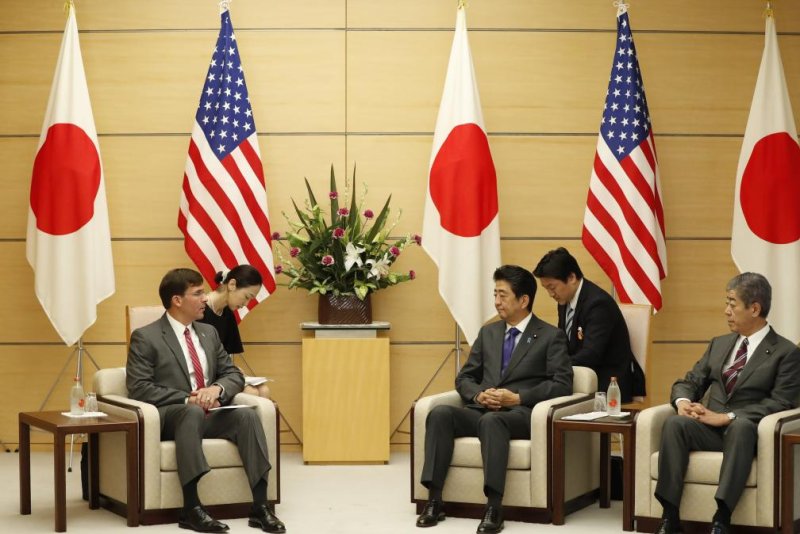U.S. Secretary of Defense Mark Esper (L) meets with Japanese Prime Minister Shinzo Abe (3-R) and Defense Minister Takeshi Iwaya (R) at Abe's official residence in Tokyo on Wednesday. Photo by Issei Kato/EPA-EFE
Aug. 7 (UPI) -- U.S. Secretary of Defense Mark Esper expressed deep concern regarding North Korea's latest tests of what the regime described as a new type of tactical guided missile during his meeting with Japanese Prime Minister Shinzo Abe in Tokyo.
Esper, who is visiting Japan for the first time since his appointment in July, met with Abe and Japanese Defense Minister Takeshi Iwaya to reaffirm the U.S.-Japan alliance, the Yomiuri Shimbun and Kyodo News reported Wednesday.
Esper also raised concerns about China's militarization of the South China Sea, describing Chinese activities, including the activation of military bases on disputed islands, as a threat to the international rule of law, according to the Japanese press reports.
The U.S. defense secretary described Pyongyang's provocations, including its latest test of missiles on Tuesday, as a major concern, breaking from President Donald Trump.
Trump had said last week North Korea's tests of short-range ballistic missiles are not a violation of Kim Jong Un's agreements with the United States.
Esper called on Japan to work together toward complete denuclearization, adding the Trump administration continues to support a resolution to the issue of Japanese abductees to North Korea.
Japanese Prime Minister Shinzo Abe said he would cooperate with the United States to realize a "free and open Indo-Pacific," referring to a Trump administration strategy toward protecting interests in the region amid Chinese expansion.
Esper did not raise the issue of Japanese participation in the Strait of Hormuz, however.
On Tuesday, Esper told reporters, "Any and every country that has an interest in freedom of navigation and freedom of commerce needs to really consider [being] involved in this type of monitoring of the [Hormuz] strait."
Japan may be refraining from joining the coalition out of concern for its bilateral relation with Iran, according to reports.















